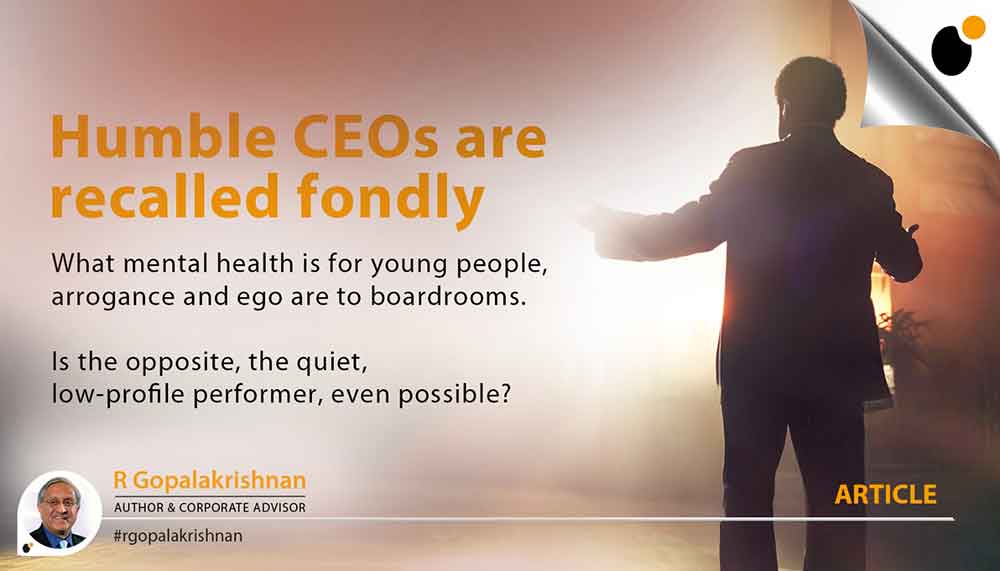7th June 2019 BUSINESS STANDARD
R. Gopalakrishnan*
(*The writer is a corporate advisor and Distinguished Professor of IIT Kharagpur. During his career, he was a Director of Tata Sons and a Vice Chairman of Hindustan Unilever)
Email: rgopal@themindworks.
Success can make a person rich but can also pose personal and reputational risks. After my book was published recently (Crash, Penguin, 2019), a few readers expressed incredulity about how power could actually “damage” the brain. Unfortunately, bad things do happen to excellent CEOs. The causes arise from: (i) behavior of the CEO/board, (ii) politics of the country, (iii) judgments of the judiciary, (iv) public perception, and (v) bad luck. Here are some recent incidents, exemplifying these causes, each with a cautionary lesson.
First, there is Rajat Gupta, the effervescent Indian-origin business leader who attended IIT, HBS and went on to lead McKinsey globally. At the peak of his professional accomplishments and friendship with Who is Who of the world, he was trapped in a saga of cell phone calls and others’ share dealings; Gupta was convicted in 2012 on insider trading charges and sentenced to prison. After release, Gupta wrote Mind without Fear, wherein he stated, on the advice of his lawyers, what he earlier did not. Acts like calling his business partner, Rajaratnam, within sixteen seconds of a board meeting probably nailed the circumstantial evidence. He has argued that making calls within sixteen seconds of the conclusion of a board meeting is normal. Some who heard him wondered whether he might have lost touch with reality.
High profile Thomas Middelhof had led the largest German publishing group, Bertelsmann, with great distinction until 2002 when he was eased out. By then, Middelhof was an international business icon. He then joined German retailer, Arcandor, which had fallen to troubled times. After some years of leading Arcandor, he was accused of inappropriate corporate conduct such as taking private trips on company-chartered aircraft and lavishly redecorating the office. A judge in an Essen court sentenced him to three years in prison for embezzlement and tax evasion in 2014. Middelhof was jailed despite his intention to appeal.
Released from jail in 2018, he said that he did not feel ashamed because, according to him, “Ninety nine percent of the German people already know that I am a convict.” He denied that he was wrongfully convicted. He did not regard himself as a criminal, but he fully accepted his sentence. He had never wanted to enrich himself, but, regrettably, he had been neglectful of not following proper procedures. Middelhof stated that he had “become out of touch with reality.” Nightmarish! Auch in Deutschland?
Eike Batista, a Brazilian mining tycoon, was a daring and fabulously successful entrepreneur, a symbol of flair in Brazil. He was well connected, worked incredibly hard and was the seventh richest person in the world in 2012. Dilma Rousseff, President of Brazil, had hailed Batista as ‘a national pride’. However the popular perception was that Batista had connections with all political parties, hence his empire was also sinister. In the changing politics after Dilma’s regime, in July 2018, Eike Batista was sentenced to thirty years in jail. He was allotted an ordinary prison cell with a squat toilet and cold water without recourse to ‘Mallya in British courts’ tactics. Nightmarish!
Zhang Wenzhong, the high-profile and successful promoter of Chinese supermarket, Wumart, was convicted in 2009 on charges of fraud, bribery and embezzlement. After ten years of incarceration, in a different political environment, the Chinese supreme court ordered his release with the judgement that he was innocent in the first place. High profile and undulating politics make nightmarish bedfellows, jinfang (beware, in Chinese).
Former Nissan-Renault CEO, Carlos Ghosn, has already spent more time in Japanese jails than he ever imagined. All the facts are not yet known, at least they are not clear to this writer. But it disturbs the peace of mind that he was held in jail without trial for several weeks. In polite Japan? Nihon demo?
The mind of the leader has a delicate equilibrium. In his book, The Wisdom of Psychopaths, psychiatrist Kevin Dutton describes one of the leadership mindset hazards as psychopathic behaviour, a condition combining ruthless power, oozing charm and gratification—like James Bond, according to the author.
A CEO is under intense public scrutiny, and can be convicted in the public perception long before the legal processes. The only solution is for CEOs to behave at exemplary standards, well above the legal prescription. More about this aspect in the column next month.



